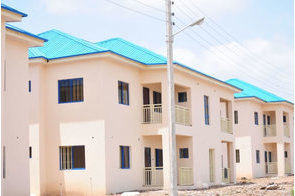Developing Nigeria’s secondary mortgage market

Summary
An established Secondary Mortgage Market attracts foreign participation in the country’s capital market.
Introduction
The development of Secondary Mortgage Markets (SMMs) is becoming an increasingly important objective of global economies. While mortgage loans are originated in the Primary Mortgage Markets (PMMs) and involve raising capital through the use of property as security, SMMs provide a platform where mortgage originators are able to sell the receivables from the loans before maturity, in return for capital. Mortgage loans may either be sold individually on the SMM or packaged into pools before being sold to increase investor participation by offering group investment options. The capital raised from these sales is used to originate more loans and thus, create immediate liquidity in the PMM. Associated rights, such as servicing the loans – which includes payment processing, collections and foreclosures – may be transferred alongside the receivables or retained by the mortgage originator.
The United States and Malaysia are prime examples of countries with successful SMMs. The development of Malaysia's SMM was driven by the National Mortgage Corporation of Malaysia, Cagamas Berhad, with a principal objective of increasing the level of home ownership in the country. Cagamas utilized, amongst other things, a Purchase with Recourse (PWR) model, which ensured that all liability associated with the loan remained with the mortgage originator. The PWR scheme allowed for large-scale investments, at good rates and longer terms, to be made at the infancy stage of the SMM; thereby creating liquidity in a non-matured market. In the United States, the Government created the Federal Housing Administration (FHA), which aimed to ensure mortgage originators are repaid in the event a borrower defaults. In addition, FHA established standardized software to assist lenders in the underwriting process, allowing for publication of uniform and widely available mortgage rate benchmarks and increased competition.
Benefits of Secondary Mortgage Markets
There are immense benefits associated with an established and fully functional SMM. Principally, it creates and maintains liquidity in the PMMs; thereby increasing the rate of mortgage origination in the PMM and consequently access to housing finance, generally. This, in turn, creates employment opportunities across the housing value chain. Finally, an established and fully functional SMM attracts foreign participation in the country's capital market and fosters overall economic growth.
Criteria for a Functioning SMM
The following are key criteria for a functioning SMM:
1. Internationally defined standards to govern the origination of mortgages and nurture quality mortgage loans and assets;
2. Strong regulatory framework that offers, amongst other things, investor protection and promotes transparency;
3. The establishment of protocols regarding the servicing of mortgages;
4. A capital market easily accessible to international investors; and
5. A healthy PMM.
Nigerian Secondary Mortgage Market
The current development of Nigeria's SMM is a consequential benefit of the housing reform of the Federal Government under the previous administration of President Goodluck Jonathan. Over 80% of Nigerians lack access to conventional accommodation; principally due to the barrier in accessing finance for home acquisition; while developers are unable to access long-term finance for construction and are compelled to take on short-term loans at high interest rates. In 2012, the former President launched the National Housing Finance Programme to tackle the housing deficit, with the particular agenda of increasing access to finance on both the demand and supply sides of the housing sector.
In 2013, the Nigerian Mortgage Refinance Company Plc (NMRC) was incorporated to improve accessibility to affordable housing for Nigerians through the raising of long-term funding from the capital market and channeling these funds to improve liquidity of the mortgage markets. The funds will be provided to mortgage originators/private mortgage institutions as consideration for the purchase of their existing mortgage pools. The NMRC is pioneering the development of the Nigerian Mortgage Market from two principal focal points – (1) standardization of the PMM and (2) the development of an adequate regulatory framework to monitor and facilitate the origination process and the mortgage markets as a whole.
Standardization
Standardization of the PMM plays a critical role in achieving the key aspects of a SMM. By setting a firm foundation for originating loans, the quality of mortgages originated is enhanced, thereby reducing the likelihood of delinquent and non-performing loans being created. A quality-enhanced PMM also makes the process of securitizing and trading loans on the secondary market simpler; while opening up channels for international investments and long-term finance.
1. Underwriting Standards
Underwriting standards are the set of criteria developed and used to guide investment decisions. These are designed to ensure mortgage loans achieve a homogeneous status at the point of origination; thereby providing the necessary assurance needed to purchase an interest in the pool at the lowest risk possible. Where mortgage pools contain a variety of mortgages, each with their own unique terms and documentation, the cost of due diligence will be high and competition of sale on the secondary market will be low. Uniformity of mortgage loan characteristics – such as tenure of property, loan maturity period, interest rate and the type of property eligible – reduces the overall transaction costs of evaluating and processing mortgage loans in preparation for creating mortgage-backed securities for sale.
As part of its standardization process, the NMRC, with input from the World Bank/International Finance Corporation, has created a robust set of Uniform Underwriting Standards (UUS) which, when conformed to, will qualify mortgage loans as eligible for refinancing on the SMM. The UUS outlines the criteria for mortgage loans and lender eligibility to loan; thereby ensuring key features are in place for enforcing legal mortgages, including quality collateral, adequate property title and proper registration and procedures.
2. Documentation
Documents governing the relationship of all participants in the SMM are an important part of standardization. In Nigeria, the development of uniform documentation spans across all parts of the mortgage securitization process and includes standardizing the following - Mortgage Lending Documentation and Refinancing Documentation. This simplifies the registration processes; clearly delineating each party's responsibilities and mitigating investor risks. In addition, many developed SMMs have a title report or title insurance policy as part of the documentation for trading on the market. This reduces administrative costs, in the form of title searches, indicates ownership and status of the property being used as security and, with the inclusion of title insurance, investors are protected against the risk of the mortgagee having false title or other encumbrances which rank higher than the security being provided.
Servicing of Mortgages
The servicing of mortgages refers to the ancillary activities attached to mortgage loans such as the actual collection of the mortgage payments and the periodic remittance of these payments to the investor. Those servicing the mortgages may either be originators or third parties, and they act as the primary source of information on the loans. As a result, they are tasked with ensuring the information on each mortgage loan or pool is accurate. They have the obligation of keeping investors informed, through timely reports, on the status of the mortgage loans/pools including balances history and performance.
An important part of servicing, tied in with the UUS and standard documentation, is the procedure and guidelines for collection of mortgage payments. As part of its guidelines on collection, the UUS make provision for a deduction at source payment scheme and a credit enhancement structure, which includes an employment and income verification report. An ICT infrastructure to aid in the management, processing and dissemination of all mortgage loans to be traded is also a critical component of an SMM as it ensures accurate monitoring and record keeping processes.
Regulatory Framework
A strong regulatory framework enhances mortgage markets by addressing the obstacles typically faced in loan origination, such as high administrative costs and lengthy timeframe for the registration. In addition, it monitors the general conduct of the market, creates fair and effective settlement procedures by ensuring a balance of interests amongst all market participants and promotes transparency by adequately controlling the level of disclosures required for creating mortgage pools. The main elements of the regulatory framework are the Central Bank of Nigeria (CBN) Regulations, the Investment & Securities Act and Rules of the Securities and Exchange Commission (“SEC Rules”) and a new Model Mortgage and Foreclosure Law being drafted with a specific aim of developing the PMM.
1. Central Bank of Nigeria (CBN) Regulations
CBN has established a regulatory and supervisory framework, pursuant to the provisions of the Central Bank of Nigeria Act (CBN Act), Banks and Other Financial Institutions Act (BOFIA) and the Investment & Securities Act (ISA), all of which govern the operation of Mortgage Refinance Company (MRC) and, in turn, shapes the mortgage markets. The framework prescribes the basic regulatory requirements that govern MRC's operations, including its minimum paid-up capital, maximum leverage limit and types of collateral used and sources of funds to be used for its operations. It further highlights the MRC's corporate governance requirements, by setting out the duties and responsibilities of its Directors and senior management. CBN ensures MRC's compliance with the guidelines by granting approvals-in-principle, final licenses and issuing penalties for any violations under the regulations.
2. Investment & Securities Act and Rules of the Securities and Exchange Commission
The ISA and SEC Rules impose obligations on MRC that promote accountability and transparency; thereby allowing regulators in the capital market monitor liquidity. Examples of obligations include registering all securities with the Securities and Exchange Commission (“SEC”), the filing of annual reports with the SEC, which must also disclose the level of compliance with the SEC Code of Corporate Governance. As a result of such obligations, individuals/corporations are given the desired comfort to invest; which increases the level of activity in the market.
3. Model Mortgage and Foreclosure Law
The NMRC is also driving the development of a model mortgage and foreclosure law; to be adopted by each state in the country. The major objectives of the law are to fast track the process for creating legal mortgages; ensure the timely resolution of land disputes and create an efficient foreclosure process in the event of a borrower default. A more practical addition to the regulatory framework is the establishment of a mortgage registry in each state.
The Nigerian Capital Market
The Nigerian Capital Market (NCM) plays an important role in the development and sustainability of a SMM, with its main participants being the Securities and Exchange Commission (SEC), Nigerian Stock Exchange (NSE), stockbrokers, trustees, issuing houses and registrars. The NCM has experienced steady growth since the 1960s with several key milestones including the appointment of the panel to the Review of the Nigerian Capital Market by the Federal Government; whose functions included reviewing the roles of regulatory agencies in particular, their oversight functions and suggesting recommendations of improvement; and the enactment of the Investment and Securities Act, which became the principal legislation concerning conduct and operation of the NCM.
With the establishment of the NSE, the NCM has experienced stable development into a solid platform necessary to support the activities of both a PMM and SMM and the continued growth of each.
Conclusion
While the pursuit of a robust SMM in Nigeria has been rejuvenated by the establishment of the NMRC on international best practice principles; it will be several years before the Nigerian SMM will become self-sufficient - with mortgage originators creating securities over their own mortgage loans without the need for mortgage liquidity institutions. The SMM, however, potentially has the impact of improving the sources of finance available for affordable housing, as cheaper loans with longer maturity become more popular in this jurisdiction.
Detail Commercial Solicitors is distinct as Nigeria's first commercial solicitor firm to specialize exclusively in non-courtroom practice. Based in Lagos, Nigeria's business capital, DETAIL is totally committed to its clients' business objectives and reputed for dealing with the minutiae.
Related
-
AfDB approves $40 million loan for South African housing company
Housing Investment Partners Trust aims to provide over 4,000 affordable mortgages to lower-middle income earners.
-
Improved housing could reduce malaria cases
Besides insecticide-treated bednets and indoor spraying, modern homes could provide additional control to malaria cases.
-
Sustainability recommendations for 2022
It is important that we charge forward boldly in the new year and remain resilient to challenges, as we pursue a ...







